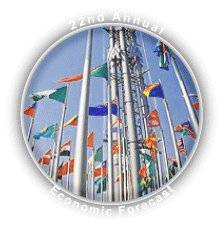
SMA 21st Annual Economic Forecast 2006 is my coverage of the SMA/Harvard Club annual confab featuring David Hale and Lyric Hughes-Hale
The Strategic Management Association and The Harvard Club jointly sponsored the Economic Forecast 2006 featuring David Hale and Lyric Hughes-Hale. David presented his encyclopedic knowledge and perspective on global economic trends, while Lyric shared her insights on China in Part II of the evening (she was the founder of China Online and has focused on China for several years.).
As usual, I present my notes, followed by my insights. Here are my notes from David’s presentation (Part I of the meeting).
[…]
Surprises in the Emerging Chinese Consumer Market highlights the Internet-powered practice of consumer collaboration and group buying for discounts.
“Chinese Consumers Overwhelm Retailers with Team Tactics,” The Wall Street Journal, February 28, 2006 is a perfect example of how mature market assumptions can lead to surprises in emerging markets. Chinese consumers increasingly meet on the Internet chat rooms to plan and coordinate a group buying strategy for a type of good or even brand. Then they go to the retailer as a group to extract significant group discounts. This practice is known as tuangou, or team purchase, and can play havoc with companies’ pricing strategies and margins, to say the least.
[…]
Insight about Human Resources in China featured speakers with decades of experience on the ground in China and offered surprising experiences. The GSB (Booth) International Round Table hosted two Asia and cross-cultural experts 16 February 2006 at Gleacher Center, “Human Resource Challenges for Multinational Corporations in China.” As is my custom, I will summarize the salient facts of the session first, which will be followed by my analysis.
This discussion was led by Deborah Lauer, former VP Global Talent Supply at Motorola who spent six years in China, and Jeffrey Reed, a 20 year veteran of Asia who headed up Unilever-Best Foods joint ventures in Pakistan and China. The talk focused on MNCs’ (multinational corporations) human resource challenges in China, both from expatriate and local talent perspectives. Many of the ideas presented corresponded to the ITA Round Table led by Dr. Wolfgang Fürniß (see China: The New Economy).
[…]
The End of Corporate Imperialism, by C.K. Prahalad and Kenneth Lieberthal, encapsulates the obvious elegantly and factually, and its thesis is far more true today than in 1998, when it was written: “Too often, companies try to impose Western models of commerce on developing countries. They’d do better—and learn more—if they tailored their operations to the unique conditions of emerging markets.” Western MNCs (multinational corporations) perceive the primitive state of consumption in emerging markets, and they too often develop a strategy in which they: 1) focus on the extreme minority of wealthy consumers and/or 2) address the order of magnitude larger middle tier of the market by offering their past-mature products with minor cosmetic changes.
This is another symptom of MNCs’ being stuck between industrial and knowledge economies. As I stated in my Transourcing Point of View, “Enterprises are ambivalent about innovation and product creation because they represent an inherent conflict: the drive to amortize past investments (including process-oriented constraints of marketing, distribution, service, etc.) conflicts with companies’ need to satisfy customers’ wishes for novelty. In practice, this too often leads to vapid product extensions.” The industrial-era enterprise derived its competitiveness largely through production and distribution efficiency, and it marketed […]
At the MIT Enterprise Forum’s Innovation and Technology Forecast in Chicago Tuesday, there was significant discussion about China’s growth and what that would mean for innovation in Illinois. Many speakers also made references to the importance of catering to knowledge workers. Chunka Mui, Dan Ratner, Geoffrey Kasselman and Jerry Mitchell were panelists, and Jerry spends significant time in China. His admiration for what is happening in China was contagious and triggered the train of thought here.
[…]
Rare Legal and Business Insight into Offshore Countries and Regions describes Baker & McKenzie’s excellent webcasts focused on offshore business.
Depending on your business strategy, it may make sense to explore offshoring to several regions of the world to mitigate the risk that your partner might be affected by natural disasters or political upheaval. In fact, many offshore experts recommend a portfolio strategy for risk mitigation or operational effectiveness (follow the sun operations can reduce time to market) while meeting cost objectives.
[…]
China: The New Economy summarizes that, by any measure, China is a juggernaut in the early stages of flowering on the global stage: As a consumer market, it has the potential to be the largest in the world as the country is the most populous. As a hub of human capital in a knowledge economy, it will become an epicenter of service-based knowledge workers. As an ambassador of Southeast Asia, it will influence what will arguably be the deepest talent pool in the world. This will cause a reconfiguration of the world’s knowledge network.
[…]
The United States is a unique country in many ways, notably in its collective, pervasive idea of the “immigrant” experience. As everyone learns in Civics class, the majority of Americans immigrated to the U.S. within a relatively compressed time frame in order to gain economic, religious or other freedoms that they did not have at “home.” Moreover, the land was new, with only emerging cultural ideas and structures to impose themselves on the new arrivals. The immigrant experience was pervasive because the number of immigrants compared to the number of U.S.-born citizens was high during the 18th and 19th centuries. The immigration experience was therefore formative in the U.S. culture itself.
[…]
|
|

